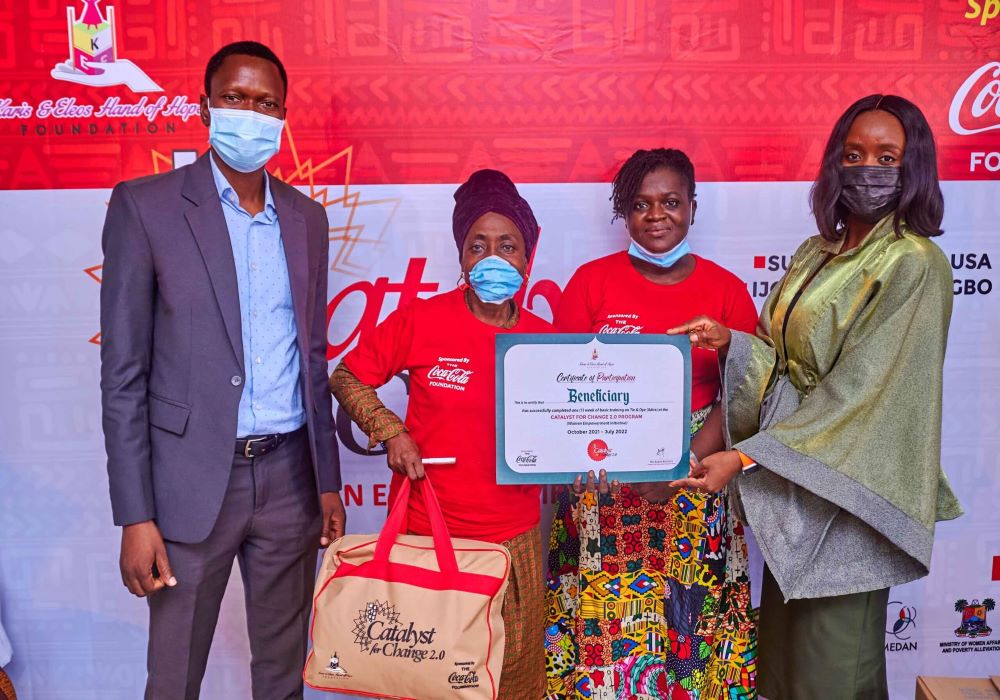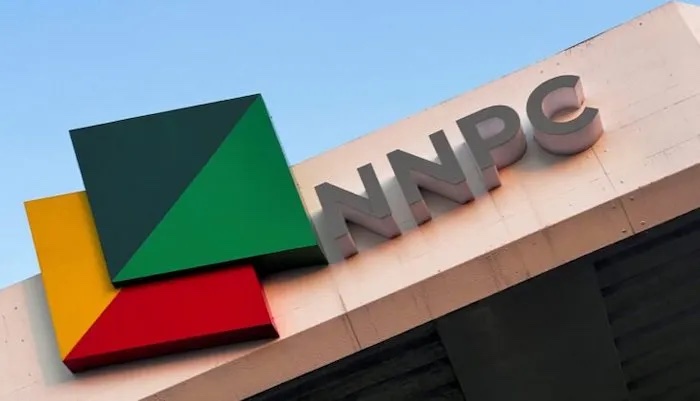Business
Coca-Cola’s Catalyst for Change Programme Empowers 10,000 women

By Edozie Obasi-Eze
In a quest to improve the lives of underserved women across diverse communities, The Coca-Cola Foundation-funded women empowerment initiative, Catalyst for Change, implemented by a local NGO partner, Karis and Eleos Hand of Hope Foundation, has successfully empowered another batch of 1,000 women in Alimosho, Lagos State.
This makes it a total of 10 communities reached under the scheme with over 10,000 women impacted. The initiative focused on providing business and vocational skills to help lift them out of poverty and marginalization, and finally over 2,000 women provided with start-up kits to help kick-start their small-scale enterprises – 200 of which received start-up kits at the Alimosho closing ceremony.
The Catalyst for Change Scheme is one of Coca-Cola’s several women empowerment and youth development initiatives where women are trained in some essential vocational skills such as pastry making, shoemaking, fashion designing, makeup artistry, wig making, tie and dye, household essentials, and bag making. Some participants were also provided with financial literacy and business management classes around bookkeeping, personal and product branding, social media management, and customer relationship management.
According to the Director, Public Affairs, Communications, and Sustainability, Coca-Cola Nigeria, Nwamaka Onyemelukwe, the beneficiaries of the programme are expected to use the skills garnered therefrom to, not only better their personal economic status but to contribute their quota to the economic development of the country.
She highlighted that the company remains focused on women empowerment because of its belief that women are pillars of society and community as reflected in the company’s new Africa sustainability platform, JAMII, which focuses on waste management, water stewardship and wealth creation for women and youths.
She said, “The goal of the just concluded Catalyst for Change 2.0 programme was to integrate underserved women into a growth trajectory that generates value for their families and society and The Coca-Cola System is thrilled about the outcomes and impact stories so far. I am confident that this batch of beneficiaries will attain an even better degree of achievement as they launch out with the skills and support received through the programme”.
Founder, Karis and Eleos Hand of Hope Foundation, Bukola Bamiduro, advised the beneficiaries to continuously create value in their communities through the application and transmission of knowledge while uplifting themselves and others, thereby leading to the formation of a cycle of transgenerational businesses.
Bamiduro said, “The last 10 months have been exciting for us. This is a mini-closing ceremony for Alimosho but this also marks the end of Catalyst for Change 2.0. We have seen the income of our beneficiaries move from $1 per day to $10 per day”.
She thanked The Coca-Cola Foundation for financially supporting the project, saying she hopes to continue to hear inspiring stories from the various beneficiaries across the ten communities reached during the Catalyst for Change programme.
A beneficiary from the Alausa community, Nofisat Adenike, explained that the Catalyst for Change 2.0 programme has changed the way she sees life and business as she has moved on to establish her baking business. This and more remain the success stories of the women who have gone through the programme, taking great learnings and inspiration from their facilitators and coaches.
For Coca-Cola, women empowerment and bridging the gap of opportunities are essential for achieving an inclusive and sustainable society positioned for economic growth. Since 1984, The Coca-Cola Company has contributed more than $1.2 billion to help empower women, protect the environment, and enhance communities, socially and economically, around the world.
Business
Trade Tensions Hit Nokia As Q1 Ends In €68M Loss
Nokia has reported a net loss of €68 million for the first quarter of 2025, a sharp decline from the €438 million profit recorded during the same period last year.
The Finnish telecoms equipment maker attributed the downturn to global trade disruptions and recently imposed tariffs by the United States.
The company’s net sales dropped slightly to €4.4 billion, down by one percent year-on-year.
READ ALSO: Trade War: China Strikes Back Wth 125% Tariffs On U.S. Goods
Tariff-related challenges were highlighted by Nokia’s President and CEO, Justin Hotard, who acknowledged the broader economic pressures affecting the industry.
“We are not immune to the rapidly evolving global trade landscape,” Hotard stated. “However, based on early customer feedback, I believe our markets should prove to be relatively resilient.”
He also noted the potential short-term financial impact, saying, “Based on what we see today, we currently expect a EUR 20 to 30 million impact on our comparable operating profit in the second quarter from the current tariffs.”
Earlier this month, U.S. President Donald Trump introduced a 10 percent tariff on global imports, while pausing plans for steeper duties, including a proposed 20 percent levy on products from the European Union.
Despite the quarterly setback, Nokia expressed confidence in its growth prospects.
The company is looking to its Network Infrastructure, Cloud and Network Services, and Mobile Networks divisions to drive sales in the year ahead.
In a sign of continued momentum in the mobile segment, Nokia also announced on Thursday that it had extended its contract with T-Mobile US.
The company said it is continuing “to see positive signs of stabilization” in Mobile Networks.
Business
Marketers In Anguish, As Dangote, NNPC Ltd War Drag Price To N880/litre

The pull of market forces which moved the hands of the Nigerian National Petroleum Company Limited (NNPC Ltd) to reduce the price of Premium Motor Spirit (petrol) to N880 per litre in Lagos and N935 in Abuja appears to be a source of torture to independent markets.
Biztellers reports that the latest price review on Easter Monday saw NNPC retail outlets in Lagos drop from N925 to N880, while those in Abuja adjusted from N950 to N935.
The NNPC Ltd’s price reduction came barely a week after the Dangote Refinery lowered its ex-depot price from N865 to N835 per litre.
ALSO READ: BREAKING: Again, Dangote Cuts Petrol Price To N835 per Litre
In addition, the $20bn refinery also directed its partners like MRS, Heyden, and Ardova to sell a litre of petrol at the rate of N890 instead of N920 in Lagos, N900 in the South West, N910 in the South-South, and N920 in the North East.
Consumers can smile because with the reaction, the NNPC Ltd’s new price in Lagos is N10 lower than what the Dangote Refinery is selling at, which might lead to another reaction, as the price war between the two companies.
Though some NNPC Ltd’s retail outlets were observed selling at the old rate in Lagos, it was gathered that they were given the liberty to exhaust old stock before adjusting to the new prices.
Market sources are of the view that the current price war was ignited by the Federal Government’s implementation of the Naira-for-crude policy.
Business
Gold Prices Hit Historic $3,500 Amid Trump Tariffs, Fed Tensions
Gold soared to a record high of $3,500 an ounce on Tuesday, as mounting fears over a potential U.S. recession and escalating tensions between President Donald Trump and the Federal Reserve drove investors toward the traditional safe-haven asset.
The precious metal briefly touched an all-time high of $3,500.10 an ounce before retreating slightly to trade at $3,467.87.
READ ALSO: JUST IN: Vatican Discloses Cause Of Pope Francis’ Death
The rally marks the latest in a string of record-breaking gains for gold, fueled by a weakening U.S. dollar, sharp declines across global stock markets, and growing concerns over the health of the world economy.
Market sentiment took another hit this week after President Trump ramped up his trade war with China, slapping fresh tariffs on the world’s second-largest economy and intensifying fears of prolonged economic disruption.
Gold has surged more than 30 percent since the start of the year as investors seek refuge from mounting market volatility.
“The rally reflects ongoing recession fears in the U.S. economy and heightened political tensions, especially as President Donald Trump continues to attack Federal Reserve Chair Jerome Powell,” said Rania Gule, senior market analyst at trading group XS.com.
Concerns about the Fed’s independence were further stoked Monday, when Trump publicly lashed out at Powell on social media, branding him a “major loser” for not cutting interest rates — a move the president has repeatedly demanded.
The sharp criticism follows Trump’s recent suggestion that he might attempt to remove Powell from his post.















